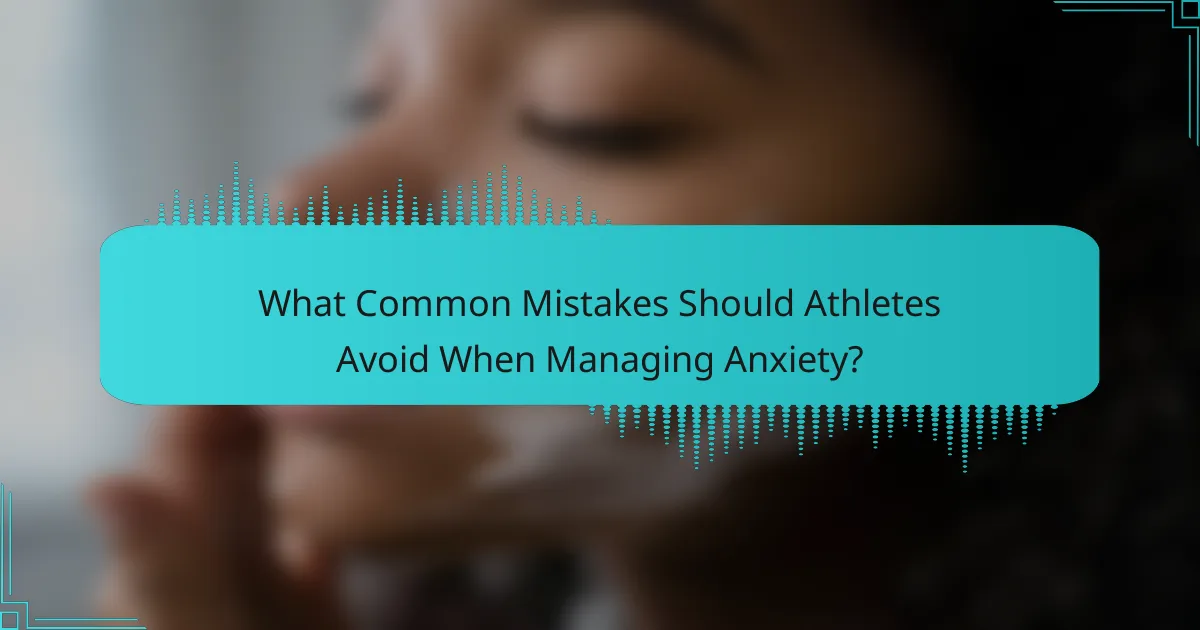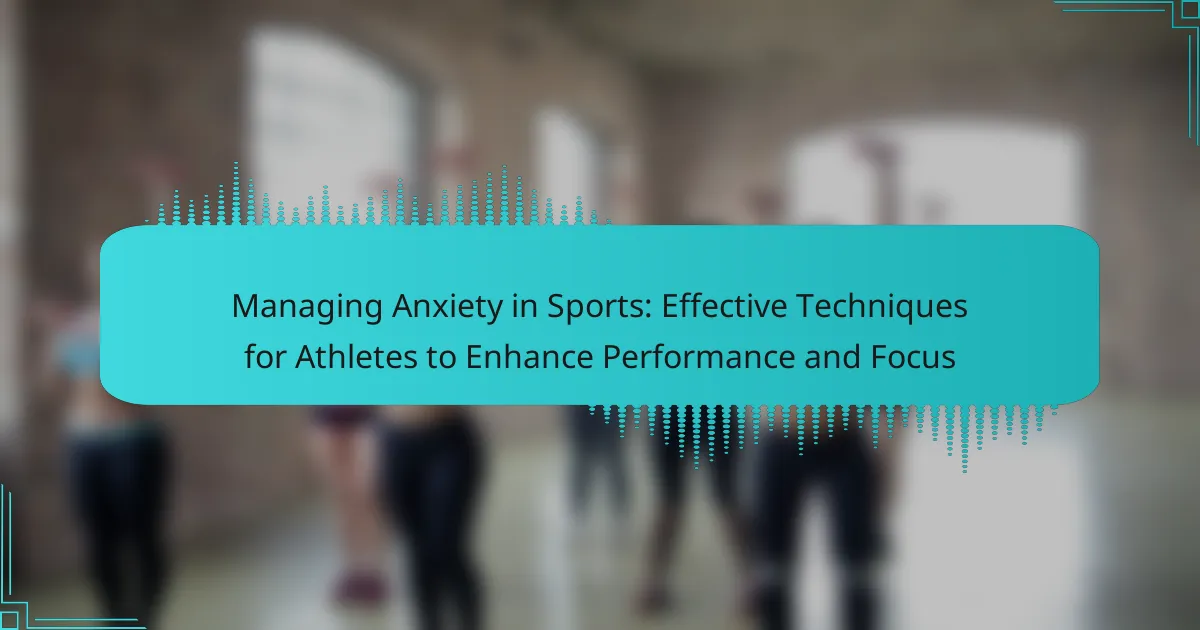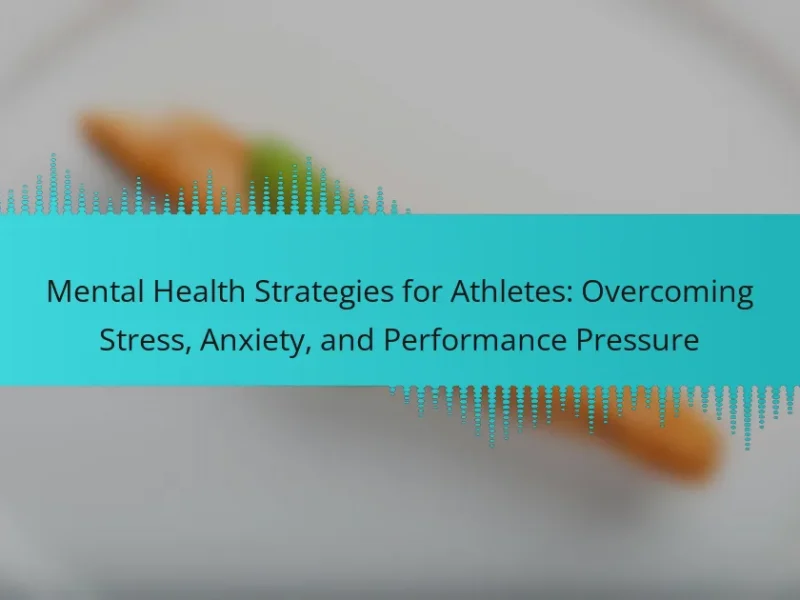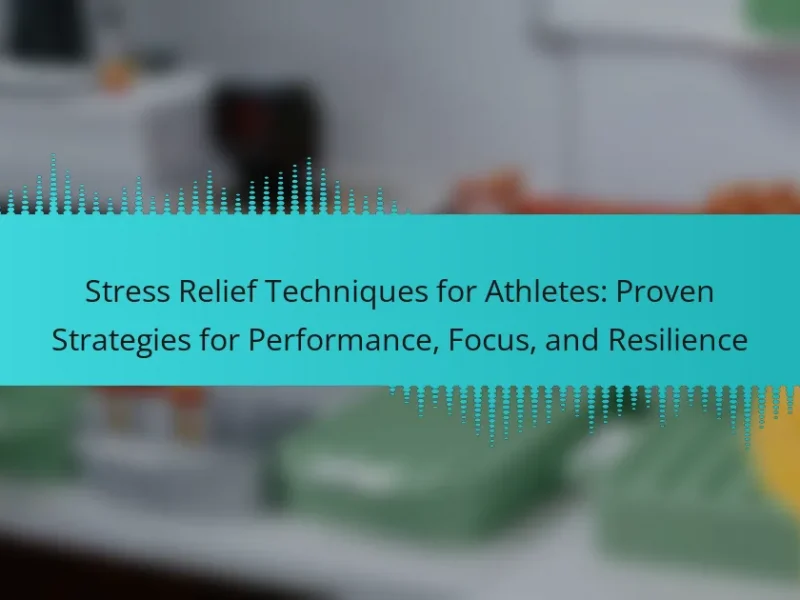Managing anxiety in sports is crucial for athletes seeking to enhance performance and focus. Techniques like mindfulness, visualization, and controlled breathing can effectively reduce stress levels. Coaches play a vital role by fostering open communication and a supportive environment. Recognizing and addressing anxiety is essential for athletes to perform at their best.

How Can Athletes Manage Anxiety in Sports?
Athletes can manage anxiety in sports through techniques like mindfulness, visualization, and controlled breathing. These methods enhance focus and performance by reducing stress levels.
Mindfulness practices help athletes stay present, decreasing anxiety by shifting attention from worries about performance. Visualization allows athletes to mentally rehearse successful outcomes, boosting confidence. Controlled breathing techniques regulate physiological responses, promoting calmness during competition.
Research shows that athletes using these techniques report improved performance and reduced anxiety levels. For instance, a study found that mindfulness training led to a 20% reduction in anxiety among competitive athletes. Regular practice of these techniques fosters resilience, enabling athletes to perform under pressure.
What Are the Common Causes of Anxiety Among Athletes?
Common causes of anxiety among athletes include performance pressure, fear of failure, and intense competition. These factors can lead to heightened stress levels, impacting focus and overall performance. Athletes often face expectations from coaches, teammates, and themselves, which can exacerbate anxiety. Additionally, injuries and recovery processes can create uncertainty, further contributing to anxious feelings. Understanding these causes is crucial for implementing effective anxiety management techniques in sports.
What Techniques Can Help Reduce Performance Anxiety?
To reduce performance anxiety, athletes can employ techniques such as visualization, deep breathing, and positive self-talk. Visualization involves imagining successful performance scenarios, helping to build confidence. Deep breathing techniques can calm the nervous system and enhance focus. Positive self-talk encourages a constructive mindset, replacing negative thoughts with affirmations. These strategies collectively enhance mental resilience and improve overall performance.
How Does Deep Breathing Contribute to Anxiety Management?
Deep breathing significantly aids anxiety management by promoting relaxation and reducing stress levels. This technique enhances oxygen flow, which can improve focus and performance in sports. Research indicates that athletes using deep breathing exhibit lower anxiety levels and better emotional regulation. Regular practice can lead to improved mental clarity, allowing athletes to maintain composure under pressure. By incorporating deep breathing into training routines, athletes can optimize their performance and manage anxiety effectively.
What Role Does Visualization Play in Enhancing Focus?
Visualization significantly enhances focus by creating mental imagery that aligns with athletic performance goals. Athletes who practice visualization techniques can reduce anxiety and improve concentration. Research shows that visualizing successful outcomes activates similar brain regions as actual performance, reinforcing muscle memory and confidence. This technique serves as a unique attribute in managing anxiety, enabling athletes to mentally rehearse their actions and strategies. As a result, visualization becomes a critical tool for enhancing focus and overall performance in sports.
What Unique Strategies Can Athletes Use to Cope with Pressure?
Athletes can use unique strategies like visualization, mindfulness, and routine building to cope with pressure. Visualization involves imagining successful performances, which enhances confidence. Mindfulness helps athletes stay present, reducing anxiety about outcomes. Establishing a consistent pre-performance routine fosters a sense of control and focus.
How Can Mindfulness Practices Improve Athletic Performance?
Mindfulness practices significantly enhance athletic performance by reducing anxiety and improving focus. Techniques such as meditation, breathing exercises, and visualization help athletes maintain composure under pressure. Research indicates that athletes who engage in mindfulness report lower stress levels and improved concentration, leading to better performance outcomes. For instance, a study found that mindfulness training improved the performance of collegiate athletes in high-pressure situations. By incorporating these techniques, athletes can effectively manage anxiety and enhance their overall performance.
What Are the Benefits of Positive Self-Talk for Athletes?
Positive self-talk enhances athletes’ performance by reducing anxiety, boosting confidence, and improving focus. It fosters a positive mindset, enabling better decision-making during competitions. Research shows that athletes who practice positive self-talk experience lower stress levels and increased resilience. This mental strategy can lead to improved outcomes and overall satisfaction in sports.
What Rare Techniques Are Emerging for Anxiety Management in Sports?
Emerging techniques for anxiety management in sports include biofeedback, mindfulness meditation, and virtual reality exposure therapy. These methods help athletes enhance focus and performance by addressing anxiety in unique ways.
Biofeedback allows athletes to gain awareness of physiological responses, enabling them to control stress levels effectively. Mindfulness meditation improves mental clarity by promoting present-moment awareness, reducing anxiety during competition. Virtual reality exposure therapy simulates high-pressure situations, helping athletes practice coping strategies in a controlled environment.
These rare techniques offer innovative approaches to managing anxiety, enhancing overall athletic performance.
How is Neurofeedback Being Used to Enhance Athlete Performance?
Neurofeedback enhances athlete performance by training the brain to manage anxiety effectively. This technique uses real-time feedback from brain activity to help athletes develop better self-regulation and focus. Research indicates that athletes using neurofeedback experience reduced anxiety levels, improved concentration, and enhanced overall performance. For instance, studies show a significant correlation between neurofeedback training and increased scores in competitive settings. This unique approach not only addresses anxiety but also fosters a calm and focused mindset, essential for peak athletic performance.
What Role Does Biofeedback Play in Stress Reduction?
Biofeedback plays a crucial role in stress reduction by helping athletes gain awareness of their physiological responses. It uses real-time data to train individuals in self-regulation techniques, enhancing focus and performance. For example, heart rate variability biofeedback can improve emotional regulation and reduce anxiety levels. Studies show that athletes using biofeedback can experience up to a 30% decrease in perceived stress, leading to better performance outcomes. This method empowers athletes to manage stress effectively through personalized feedback and practice.

How Can Coaches Support Athletes in Managing Anxiety?
Coaches can effectively support athletes in managing anxiety through tailored strategies. Techniques include fostering open communication, implementing relaxation exercises, and promoting a positive team environment.
Establishing trust between coaches and athletes encourages athletes to express their concerns. This dialogue helps identify specific anxiety triggers. Relaxation techniques like deep breathing and visualization can reduce stress and enhance focus during competitions.
Additionally, coaches should cultivate a supportive atmosphere that emphasizes effort over outcomes. This unique approach helps athletes view challenges as opportunities, reducing performance-related anxiety.
Regular check-ins and mental health resources can further empower athletes to manage anxiety effectively, ensuring they perform at their best.
What Communication Strategies Foster a Supportive Environment?
Effective communication strategies that foster a supportive environment include active listening, constructive feedback, and open dialogue. These approaches enhance trust, enabling athletes to express concerns and seek guidance. Active listening ensures athletes feel heard, while constructive feedback promotes growth by focusing on strengths and areas for improvement. Open dialogue encourages sharing experiences, which can reduce anxiety and enhance performance. By implementing these strategies, coaches can create a nurturing atmosphere that empowers athletes to focus and perform at their best.
What Are the Best Practices for Creating an Anxiety-Reducing Training Atmosphere?
Creating an anxiety-reducing training atmosphere involves fostering a supportive and calm environment. Key practices include establishing clear communication, setting realistic goals, and incorporating relaxation techniques.
Encourage open dialogue among athletes to express concerns. Use positive reinforcement to build confidence. Integrate mindfulness exercises, such as deep breathing or visualization, to enhance focus and reduce stress.
Promote a team-oriented culture that emphasizes collaboration and mutual support. Create a structured routine that includes warm-ups and cool-downs to instill predictability, which can alleviate anxiety.
Finally, ensure that the training space is comfortable and free from distractions. A well-organized environment contributes significantly to athletes’ mental well-being and performance.

What Common Mistakes Should Athletes Avoid When Managing Anxiety?
Athletes should avoid underestimating the impact of anxiety on performance. Common mistakes include ignoring symptoms, neglecting preparation, relying solely on willpower, and failing to seek support. Recognizing anxiety as a normal aspect of competition is crucial. Addressing it through effective techniques enhances focus and performance.
How Can Athletes Recognize and Address Their Anxiety Triggers?
Athletes can recognize anxiety triggers by identifying specific situations, thoughts, or feelings that elevate stress. They should keep a journal to track these patterns and engage in mindfulness practices to enhance self-awareness. Techniques like visualization and controlled breathing can help address these triggers effectively. Regular mental health check-ins with a coach or psychologist can provide additional strategies tailored to individual needs.
What Expert Insights Can Help Athletes Optimize Their Mental Health Strategies?
Expert insights indicate that athletes can optimize mental health strategies by incorporating mindfulness practices, cognitive-behavioral techniques, and structured routines. Mindfulness enhances focus and reduces anxiety, while cognitive-behavioral techniques help reframe negative thoughts. Establishing structured routines fosters a sense of control, further supporting mental well-being. Integrating these strategies can lead to improved performance and resilience in high-pressure situations.

What Actionable Tips Can Athletes Implement Immediately?
Athletes can implement several actionable techniques to manage anxiety and enhance performance. These include deep breathing exercises, visualization of success, maintaining a consistent routine, and setting realistic goals. Practicing mindfulness can also help athletes stay present and focused during competitions.
How Can Daily Routines Incorporate Stress Management Techniques?
Incorporating stress management techniques into daily routines enhances athletes’ performance and focus. Mindfulness exercises, such as meditation, improve concentration and reduce anxiety. Regular physical activity, like yoga, promotes relaxation and mental clarity. Scheduling breaks during training allows for mental recovery, maintaining high performance levels. Lastly, developing a consistent sleep routine supports overall well-being and stress resilience.
What Resources Are Available for Ongoing Support?
Athletes can access various resources for ongoing support in managing anxiety. These include mental health professionals, sports psychologists, online forums, and mobile apps designed for mindfulness and stress management. Additionally, support groups and workshops can provide community and shared experiences. Regular check-ins with coaches and trainers also enhance emotional well-being.


